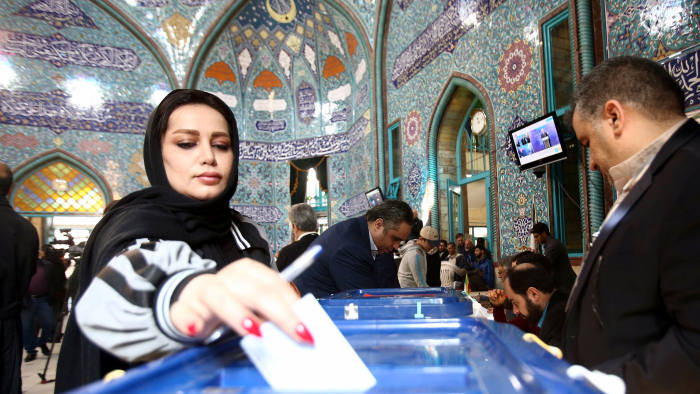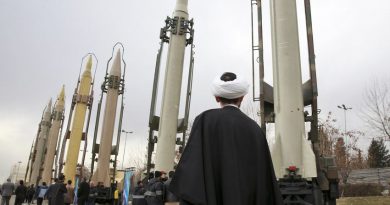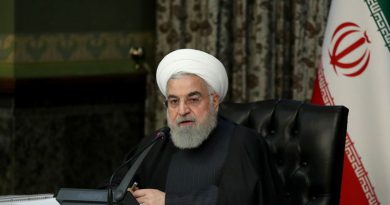OPINION: Military President or Civilian President for Iran?
by Mohammad Javad Mousavizadeh
That’s why the military president in Iran will strengthen the ideology of exporting Iran’s revolution by IRGC’s regional activity.
“I am not a colonel, I am a lawyer. I never have thought military, I never have done military,” said President Rouhani during the competition of Iran’s presidential election in June 2013 to Mohammad Bagher Ghalibaf, a military candidate in a television debate.
After Iran’s revolution in 1979, the presence of the militants in political positions has always been under question. So far, Iran has not had a military president in office, but many military veterans have been in political positions such as ministry and member of parliament. This is while Ayatollah Khomeini, founder of the Islamic Republic of Iran and the leader of Iran’s revolution clearly banned militants from political activities including candidacy in elections.
Iran’s presidential elections are scheduled to be held on June 18, 2021. As yet, some military personnel especially members of Iran’s Islamic Revolutionary Guard Corps have expressed their willingness to run the election, and the competition to choose a final candidate is processing in military think tanks. However, they do not see a powerful civilian candidate as a contender.
The military president theory in Iran was strengthened by propaganda for the leader of the foreign wing of Iran’s Islamic Revolutionary Guard Corps [G. Qassem Soleimani]. Some analysts believed he is the next president of Iran, but after his assassination by the Trump administration other names came up.
In the process, Mohammad Baqer Qalibaf the speaker of Iran’s parliament and a former IRGC commander has already started his election campaign informally. Another man is Brigadier General Hossein Dehghan who is a former air force General of IRGC and former defense minister. Dehghan that is currently serving as defense advisor to Supreme Leader Ayatollah Ali Khamenei has declared his nomination to run the presidency. Also, Saeed Mohammad that was the commander of Khatam Al-Anbiya Construction Headquarters (KAA), the engineering firm of the IRGC, resigned a few days ago and has started his election campaign. Rostam Ghasemi as the economic deputy of Quds Force and the former oil minister of Iran is another military candidate.
Moreover, the former IRGC commander Mohsen Rezaei, who has been a presidential candidate three times in 2005, 2009, and 2013 is now ready to run. Rezaei as a militant with economist gesture has taken out his military uniform several years ago. Also, the secretary of Iran’s National Security Council (SNSC) Ali Shamkhani, who served as the commander of the IRGC navy with the rank of rear admiral on 1985-1987 is another man that some media in Iran names as nominate. Moreover, the former speaker of parliament Ali Larijani who also has a background in the IRGC is a possible nominate for the presidency, but he has not declared his nomination so far.
On another side, the civilian possible candidates are an Iranian conservative politician Saeed Jalili, Ebrahim Raisi as Chief Justice of Iran, former President Mahmoud Ahmadinezhad, and Ali Motahari as a reformist and former member of a parliament.
Ahmadinezhad disqualified four years ago for the presidential election. Also, the qualification of Motahary rejected in the recent parliament election. Many analysts say that Ahmadinezhad and Motahari will be disqualified again by the Guardian Council of Iran. According to the Iran constitution, all candidates of presidential or parliamentary elections in Iran have to be qualified by the Guardian Council.
“The meaning of the military president is that we have not a civilian at the level of the presidency in the country, and this is not in the interest of the country,” said Ali Motahari the civilian candidate of the next Iran’s presidential election to Khabar Online News Agency. “The concentration of powers of military, political, economic and media in a person often leads to tyranny and corruption.”
Analysts say the main competition is between militant candidates, but Saeed Jalili and Ebrahim Raisis are close politicians to Supreme Leader Ayatollah Khamenei; therefore, they have a chance to be chosen as the final candidate from Principlists of Iran. Another possible candidate is Javad Zarif, the foreign minister of Iran. Although he rejects any nomination willingness, many reformists and moderates in Iran support him. However, he sent recently a positive signal for the run to the presidency in an interview with an Iranian Newspaper. If he can revive JCPOA, Zarif will be a choice with a high chance for the presidency. Otherwise, a hardliner candidate becomes the president.
In fact, a military president from Islamic Revolutionary Guard Corps could weaken reviving the nuclear deal. He also could increase the tensions between the two sides because the U.S designated IRGC as a foreign terrorist organization during the Trump era. And so far Biden has not withdrawn the IRGC from the list of designated terrorist groups. That’s why the military president in Iran will strengthen the ideology of exporting Iran’s revolution by IRGC’s regional activity.
But the intellectual difference is in the political space of Iran. “A president from members of IRGC can solve the problems strongly. The members of IRGC are different from militants, they ran the war and saved Iran from defeat,” said Mohsen Rafighdoust, the Minister of Revolutionary Guards in early Iran’s revolution. But Behzad Nabavi an Iranian reformist politician said to ILNA News Agency, “If a military figure from a military force resigns apparently from his position and be a candidate, it means the rule of that military force over the destiny of the nation and country. It is a coup thorough peacefully.”
Mohammad Javad Mousavizadeh is a journalist and analyst in international affairs and foreign policy. He has written many articles for digital publications around the world such as Khabar Online News Agency, Foreign Policy News, The Levant News, Eastern Herald, Modern Diplomacy, and South Front.
Disclaimer: Views expressed by writers in this section are their own and do not reflect Milli Chronicle’s point-of-view.



